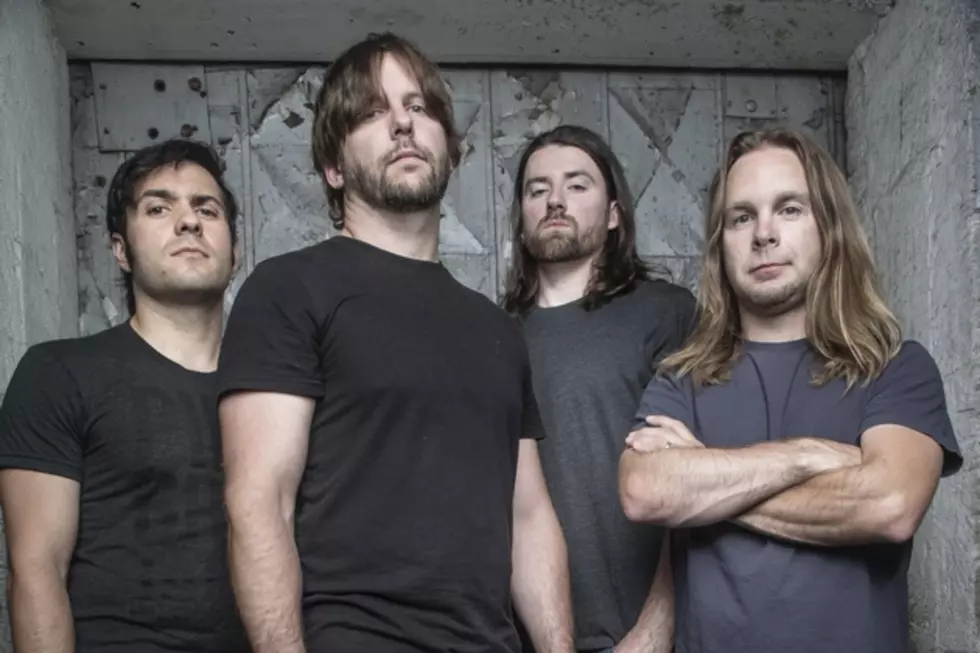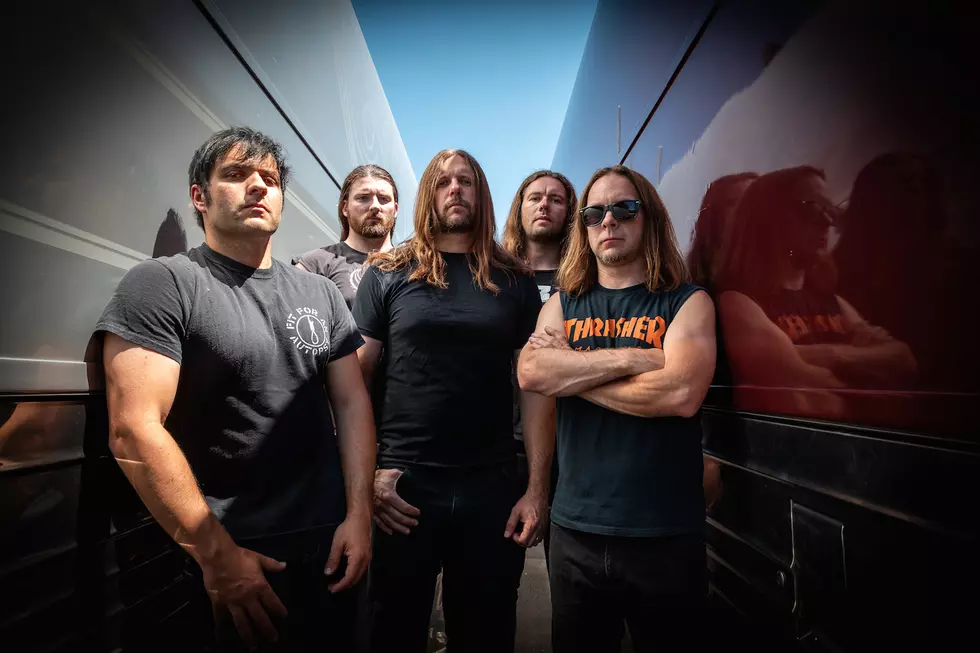
Unearth’s Trevor Phipps + Buz McGrath Talk ‘Watchers of Rule,’ Playing South Africa + More
Unearth are set to release their sixth studio album, 'Watchers of Rule,' on Oct. 27. We wanted to catch up with the guys to hear all about it, and were happy to get vocalist Trevor Phipps and guitarist Buz McGrath on the phone.
In this exclusive interview, the duo describe the heavier approach taken for 'Watchers of Rule,' the current state of metalcore, playing Johannesburg for the first time in their 16-year career and much more.
Check out our exclusive chat with Unearth's Trevor Phipps and Buz McGrath!
I was listening to 'Watchers of Rule' and I feel like it's a little closer to death metal than your past releases. Is that something you think this album brings?
Buz McGrath: You're right in that in hearing that. Musically, what we try to do is change it up a little bit, do something to make people talk about it. Unearth is Unearth, you know what you're going to get. Without actually getting cool haircuts and adding keyboard parts, we're like, let's make it more extreme and see how far we can take our skills as musicians and put it on a record. I think our new drummer, Nick Pierce, has a lot to do with that too. He's very capable, he comes from that school of death metal and more modern, technical stuff. So, his influence is heard on the record.
How did Nick come into the fold? What techniques does he bring to Unearth that haven't been present before?
BM: Writing wise, I'll send him a riff. He lives in Seattle, I live in Boston. We're never in the same room together. The first time we played these songs are at practice, after they've been recorded, which is new for us. I'll send him a riff and he'll send me back three minutes worth of music to that one riff. He'd do three different beats to the riff, then take the riff himself and cut it up to make his own idea out of that riff on the guitars that i sent him. We threw away three albums worth of music, we were that prolific. It was stuff that we were bobbing back and forth that just wasn't really up to snuff. It was cool to have somebody like that, to be able to do stuff that I always wanted to do technically, but didn't have the right drums for it or we weren't trying to do that kind of record at the time.
More furious blast beat type of stuff?
BM: Yeah. Anything we throw at Nick, he can do. There's no ceiling.
For bonus edition of 'Watchers of Rule,' you did a cover of Slayer's 'Spirit in Black.'
BM: Ol' Slayer, huh? Good guys. When we were doing the record, it was right around the time Jeff Hanneman passed away and we were thinking about that a lot, like, "Ahh, maybe we should do something. Let's do a Slayer cover." We wanted to do something that not as many people have done. We like 'Spirit in Black,' it's a cool tune, I think we can do it well. Not a lot of people cover it, so we threw a studio version down of it. We didn't try to get too fancy with it, we stuck to the Slayer formula. It's got a little bit of our stink on it, but I think it came out pretty good.
With this album, are there any themes present? Maybe an overall picture of where you guys are at? Tell me what we can find.
Trevor Phipps: I think the overall picture, with most records of ours, I try to write about what's going on in my life at the time or personal experiences, current events; this record is no different. It's everything that's going on in my life right now.
How would you explain the evolution of your voice for this album? Are there any new dynamics that we can expect?
TP: It's a little harsher on this record. We've been touring a long time, just trying to get my voice a bit more vicious. I think ton his record, you'll hear it. It's harder on this record. The songs called for a more aggressive vocal approach and they definitely happen on this album.
Take me back to the 'Strings of Conscience' sessions. How would you compare that recording process to the 'Watchers of Rule' recording process?
TP: We were kids. [Laughs]
BM: It was way easier. Nobody else was doing that sound. It wasn't even like we knew that, it was just what was coming out of us, it was so easy to do. That's how I compare it. Now, it's like, alright, there's a lot of bands that do this sound. How can we distance ourselves from the pack? But back then, it was like, you just woke up, wrote a riff and it was an Unearth riff and no one had heard it before.
TP: We were a bunch of kids that played local shows and wrote songs together.
BM: There's definitely a hunger there, because you want to get on that show with All Out War. You wanted to get that Converge show...
TP: The Buried Alive show.
BM: …you wanted that Overcast show, that Earth Crisis show. That's what you fought for -- to get in front of those 200 kids at that Earth Crisis show. That's all you really cared about it. The riffs reflected that hunger.
What about the studio aspect of it?
BM: When we did the first LP we recorded a lot of it live, which is not something that happens at all in metal these days; especially the way it's so technical that some bands … there are a few bands that can do it, but we're not one of them. We write it and then we learn it later. We get in the studio and then I show up and the drums are done. I do my guitar parts one at a time and then it comes time to tour on the record and you better hope your chops are up. You'd better be able to play it or else you're an a--hole. You learn that song beginning to end, so when you show up to practice with the band and you play it and you hone those chops over time, playing it live every night and next thing you know you're playing the song that you thought you could write. Today, we show up on stage, everybody's ready to play that song. We do our best to do it.
I always like it when a band can do it without the metronome, but then thinking of this album, you're really thrashing on this thing. You're doing super fast, intricate solos. Tell me about that. Do you think you've hit a new peak when it comes to the technical aspect of your playing or the way you place a solo into a song?
BM: I think, yes. Technically, I don't want to get more crazy than this. You know what's more fun than playing a million notes per hour on stage? It's getting drunk and playing really dumb breakdowns. That's way more fun. So the next record I feel like, let's take the summer off and just right some mosh classics, you know? [Laughs] I wanna get drunk, I wanna play a show and have a good time. Now I'm like, I can't. I drink a beer or two and you want to play good. I want to play good for the kids. They bought a ticket.
As far as recording goes, there's something to be said about getting into a room and jamming as a group and finding new sounds that way. But what we do, for technical stuff, it's all email. Email a riff, comes back, drummer has time to figure out what he wants to do without everybody watching him. To me, that's beneficial and more prolific, especially for more technical metal along the lines of what we do. Part of me does miss the getting in the room and grinding out riffs.
You were talking earlier about coming up during the rise of what would become metalcore. How have you seen your contemporaries change in the last decade or so? What do you think of metalcore's evolution?
TP: Our contemporaries have all gone away.
BM: Our contemporaries are now retired. Earlier, you [Buz] had a good answer for where metal is now -- cooler haircuts.
TP: There's a more pop-friendly version of metalcore that's out right now and I'm not going to hate on it because, you know, music evolves and goes different places. But there's also more heavy and aggressive bands like us, maybe Shadows Fall, Lamb of God, were on the harder edge of what was coming out at that time. There's other bands on that cusp right now, like a band called Harms Way; that band has been around 4-5-6 years. Nails, Early Graves. They're just the really aggressive, underground of heavy music. That's what our band started out as. Of course things evolve and go different ways, but the more popular version of what we did, and do, is the more pop version of metalcore that's around now. You know the bands that are out there and they're selling a lot of records. It's more friendly. If you lose the hardcore in that metal, just the core sound of it, it's no longer metalcore to me. It's more pop metal and that's what's happening with this genre now for the modern day bands, but metal and hardcore are very much still alive.
You recently played in Johannesburg. To me, that's amazing. Whenever any band is able to get all the way to South Africa, it's unbelievable. So few bands have been able to make it there. Tell me about that experience.
TP: For us, we started touring… I think it was 1999 was the first time we went to Canada. That blew my mind at the time. Since then, we've been around the world a bunch of times. We've been to Australia six or seven times, Japan 5 times, Europe a dozen-plus times. This last trip we just did we hit the Balkan areas of Europe like Greece, Macedonia, Bulgaria, Serbia and it was a mind-blowing experience to be in parts of the world that we never thought we'd get to visit. We're playing shows to hundreds of people who are losing their minds to our songs.
We've been trying to go to South Africa for a long time. We heard a few bands went there, bands went there years ago so we thought we'd try to go there and have a good time. The opportunity finally came this year and the guy offered to fly us out and play a festival. We headlined some fest and there were 1400 people they're losing their minds. The show was epic for us, and we got to see the countryside. We got to see the animals from the area, we went to a monkey sanctuary. It was cool to get to experience that.
BM: We just wanted to play a show with Earth Crisis. [Laughs]
Was it dangerous there? Were you protected?
BM: It's a dangerous place.
TP: Every house and hotel has the barbed wire wall. Our hotel had the barbed wire wall. It's a very nice place, but there's been break-ins and robberies there.
BM: No more dangerous than Detroit or Chicago or Camden, N.J. I'd say Camden is more gnarly than South Africa. It just feels different because you're not in your home country, that makes brings the sketchiness level up a little bit.
Thanks to Trevor Phipps and Buz McGrath for the interview! Be sure to grab a copy of Unearth's 'Watchers of Rule' on Oct. 27. To pre-order the album, click here.
More From Loudwire









